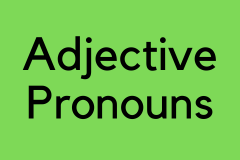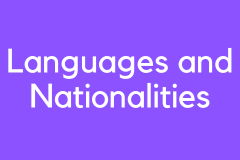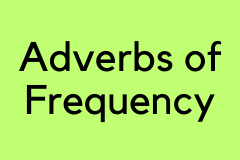Nationalities / Countries
Learn how to discuss people and things from different places in the world.
Answer the following grammar questions.
Languages and Nationalities
Point 1: The names of countries, languages, and people from a country always begin with a capital letter.
- I am from Germany.
- He can speak French.
- I love Thai food.
Point 2: The adjective form of a country is used to describe people, languages, and items from that country.
- People speak Spanish in Spain.
- She is Italian but does not speak Italian.
- We bought a Japanese car in Japan.
Nationalities
Point 3: Nationalities often follow patterns in English, but there are many exceptions. It is best to learn them case-by-case. Below are some common patterns.
-ese (No change for singular/plural)
- Japan – Japanese
- China – Chinese
- Thailand – Thai
- Portugal – Portuguese
Note: These words can describe people, languages, and items. No "s" is added for plural. Example: "They are Japanese."
-ish (Sometimes irregular spelling)
- Sweden – Swedish
- Spain – Spanish
- Poland – Polish
- Turkey – Turkish
- Finland – Finnish
Note: These words describe people, languages, and things. Example: "She is Spanish."
-i (Mostly Middle Eastern or South Asian)
- Pakistan – Pakistani
- Oman – Omani
- Saudi Arabia – Saudi
- Thailand – Thai
Note: No "s" is added for plural. Example: "They are Saudi."
-an (Spelling changes may happen)
- Germany – German
- Italy – Italian
- Mexico – Mexican
- Canada – Canadian
- Brazil – Brazilian
- Korea – Korean
- Colombia – Colombian
Note: These words often describe people and things. Example: "She is Mexican."
Other Forms
- France – French
- Greece – Greek
- Thailand – Thai
- Laos - Lao
Note: These do not follow regular patterns and should be memorized.
About the Teacher
 My name is Todd Beuckens and I am an ESL teacher in Japan.
My name is Todd Beuckens and I am an ESL teacher in Japan.
I created this site to provide teachers and students free audio lessons and learning materials not usually found in commercial textbooks.










